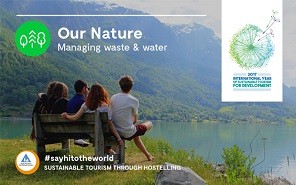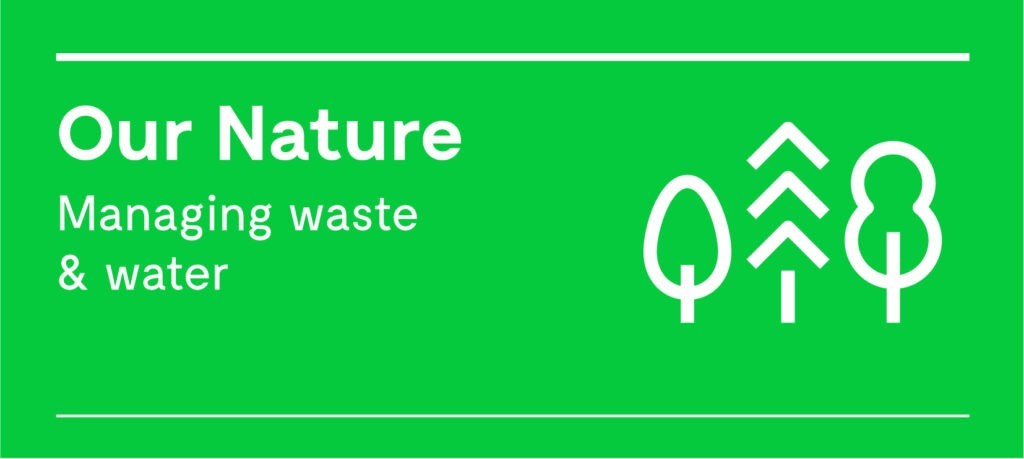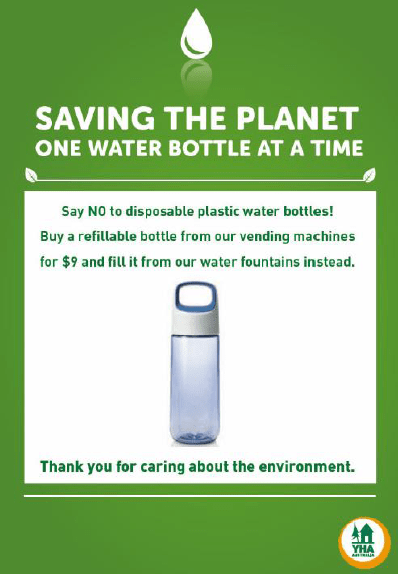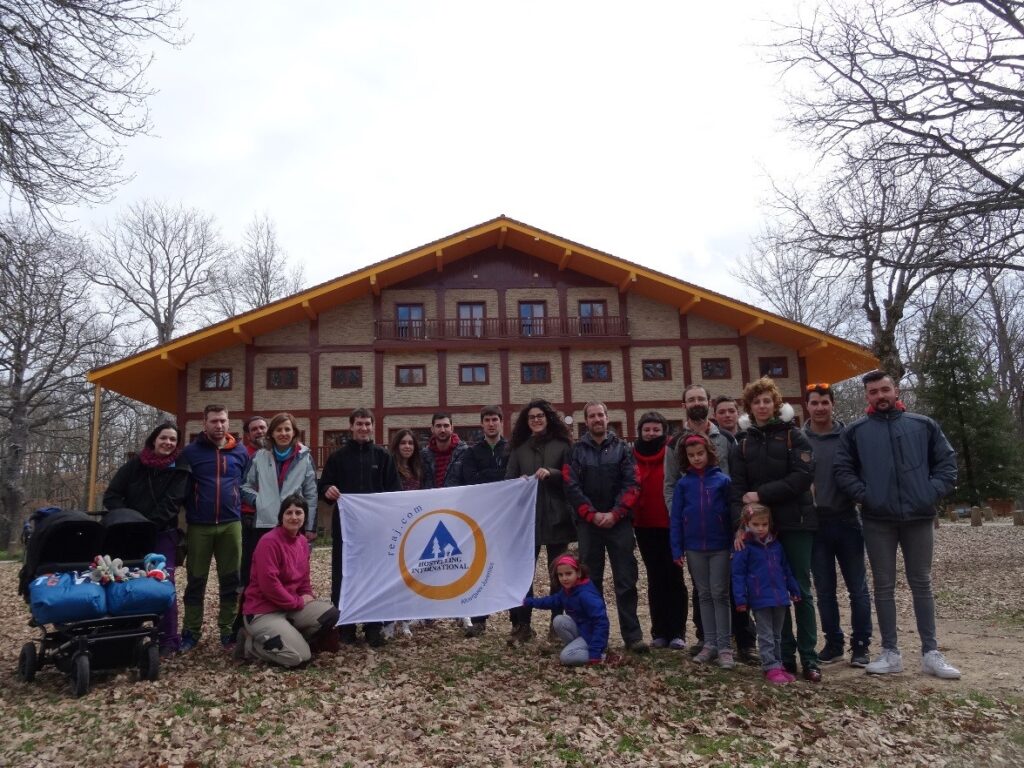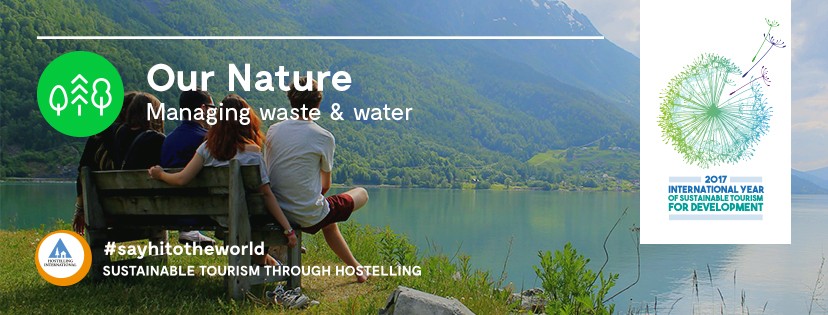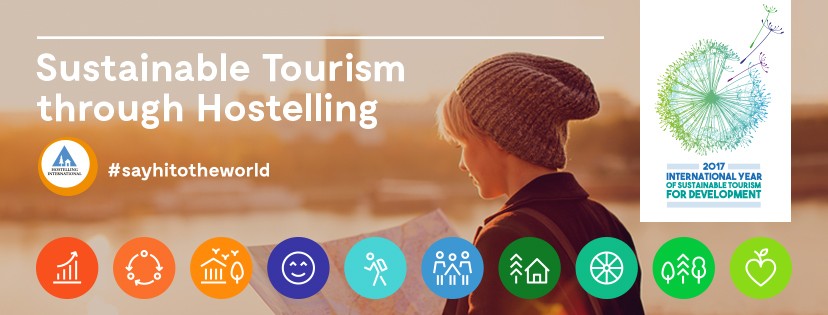Another month, another area!
As you may already know, Hostelling International is celebrating the UN Year of Sustainable Tourism for Development by running a 10-month campaign showcasing projects and practices in our HI Hostels around the globe.
In February we have tackled Consuming Sustainably and in March we continue with this topic:
This month our hostels are striving to answer questions such as:
How does managing our waste production and water consumption address the social, economic and environmental pillars of sustainable development? How can we conserve water and manage the waste produced in our hostels responsibly? How do we engage our guests in the sustainable progress of our hostels?
These and more are questions we are trying to answer in order to advance these practices in our hostels. By doing so we are aiming to address the following Sustainable Development Goals (SDGs):
(click on the image for more details on the SDGs!)
So what does Managing waste & water mean to HI and how does it apply in practice?
As hostels, we have the power to directly make a positive contribution to protecting the environment in the way we handle and manage waste as well as water usage in our operations. From daily habits to specialized equipment, our hostels are striving to use water resources efficiently and reduce their production of non-recyclable waste.
Check out two of our Star Projects for the month:
Eliminate bottled water with YHA Australia
In mid-2014 all YHA Australia operated hostels stopped selling bottled water. Instead, the hostels installed water fountains for guest use and sold refillable water bottles. The main aim was to reduce the number of plastic bottles in landfill. We did this by educating guests that tap water in Australia is safe to drink, free and that by refilling a water bottle they can help the environment and save money. We estimate that YHA has prevented up to 40,000 bottles a year from going to landfill or our oceans and waterways.
REAJ Spain – Water and Waste Initiatives
Hostel: Espinosa de los Monteros , Burgos
The hostel was awarded by REAJ with more than 4.000€ to create an organic vegetable garden in order to show young people how to grow their own healthy food and how to transform waste into compost. During March they will work on a video to emphasize on the importance of reducing and reusing waste.
Hostel: As Corcerizas, Ourense
The food served comes from fair trade sources and local organic agriculture, and the Centre has installations to manage its own waste. Products –where possible- are bought in bulk and with the least possible packaging, prioritizing the reusable over the recyclable. In terms of wastewater treatment, the Centre has a revolutionary system known as a Floating Macrophyte Filter (FMF).
Hostel: Twentytú, Barcelona
The hostel has a system for recovering the water from showers and bathrooms and using it subsequently in the WC cisterns. All the taps are fitted with timer mechanisms. The building is also fitted with a selective waste collection system that uses ducts leading to a central reception unit.
How can YOU conserve water and manage your waste responsibly during your travels?
Using water responsibly:
- Be eco-conscious about your water consumption: use accordingly the double flush if in place, take shorter showers, close the water tap while brushing your teeth
- Bring your own towel and only wash it when needed, not every day
Reduce, Reuse and Recycle Waste:
- Carry a water bottle and/or coffee mug and try to avoid (where possible) purchasing plastic bottles or disposable coffee/tea cups.Reduce food waste, buy what you need and if you still have leftovers share with other travelers: who wouldn’t be happy about free food!
- Bring a reusable bag and make sure to take it with you when discovering the city. Only purchase what you really need, can you borrow an item from a fellow person? Also, many Hostels have supplies you might be able to borrow. When you’re done with something: pass it on. Many Hostels have places where left things are offered to anyone who needs them.
- Think before buying souvenirs and check where they were produced. Will the things you buy for friends and family be useful to them?
- Use the internet and electronic guides for your travel research. If you are using printed guide books, share them with other travellers or leave them at the hostel for future guests before going home
- Take only the brochures and maps you will use and return the others to the brochure stand or leave them in the room so they can be reused or recycled
- Book flights with airlines that recycle the waste created when serving food and beverages to customers (extra bonus if you choose airlines that offset their CO2 emissions!)
- Print only what you need to print, squeeze more info on the page and print on both sides of the paper. Purchase electronic tickets and utilize online confirmations. Save travel documents to your mobile devices
- Instead of purchasing small containers of shampoo, just try to squeeze what you need in a reusable container
- Use rechargeable gadgets: batteries, cameras etc.
- Follow the instructions offered by your hostel and recycle/reuse your waste and donate unwanted items
- Pick up at least one piece of litter every day even if it’s not yours – but is not nature’s either and it’s good for your karma 🙂
Ok. So we are asking you all of the above… And what do WE do?
Here is what we are suggesting to our hostels. Look out for the actions below when visiting an HI hostel and make sure to talk about them on social media. After all, who doesn’t love when someone notices our efforts:
Water conservation:
- Develop an action plan to save water
- Install water saving taps, shower heads and double flush toilets
- Use eco-thinking in all daily activities (simple actions such as filling the washing machine & dish washers and using less or no chemicals for cleaning can go a long way!)
- Monitor the water consumption and equipment regularly(avoiding potential leaks). Implement this action in the daily housekeeping tasks and checklists, and train them to report all water leaks
- Fix dripping taps or pipes right away, do not let them waste a single drop!
- Watering plants and gardens in the early evening or morning can achieve water savings of up to 25%
- Ask guests to save water: challenge them to shower in 5 min or less, and turn off taps whilst brushing teeth
- Use water saving signs to raise awareness among staff & guests and remind them regularly
- Measure your water usage to begin with, this can often be as easy as looking at your last yearly bill of your water supplier
- When purchasing new appliances or replacing old ones, select those which have an eco-setting, like using less water or washing on lower temperatures
- Group garden plants with similar watering needs and give them the appropriate amount of water. Plant drought resistant plants where possible
- Ensure automatic watering systems are turned off in rainy periods
- Install rainwater tanks to water the garden or flush the toilets
- Implement a grey-water recycling system
Waste management:
- Review your waste management process and create a Waste Management Policy
- Use the RRRU (Reduce – Reuse – Recycle - Upcycle) formula:
- Reduce: Wholesale purchase, returning and avoiding packaging from the very beginning. You can agree with your supplier to take back the packaging (think of chemicals and consumables, plastic used for linen from the cleaning company, milk/yogurt, bakery, jams etc.).
- Reuse: Organise events for swapping unwanted clothes and books, offering left over food to shelters or farms
- Recycle: Provide facilities and information for your staff and guests to recycle
- Upcycle: from old to new with a twist. You can create bowls, baskets, jewellery, bags and many other items from discarded/old/unwanted materials: t-shirts, newspapers, by-products etc. Organising upcycling activities are not just good for the environment but they bring people together for a great cause. And it’s fun too! Create guidelines or clear and visual signage for guests, to involve them in the sustainable progress of your hostel
- Make an info board explaining the life-cycle of the waste produced at the hostels to guide both guests and staff. E.g. what company is collecting your waste, how it is being recycled or upcycled, how is the landfilled managed locally etc.
- Visit your national waste and water facilities together with your staff so they can understand better the life-cycle processes
If you have already experienced great water conservation and waste management practices in one of our HI Hostels, please share with us in comments below! Also if you are doing any other practice that we missed in our short list! We would love to hear about your hostelling experiences <3
Find out about all the other great areas of sustainable hostelling we will be tackling during 2017.
